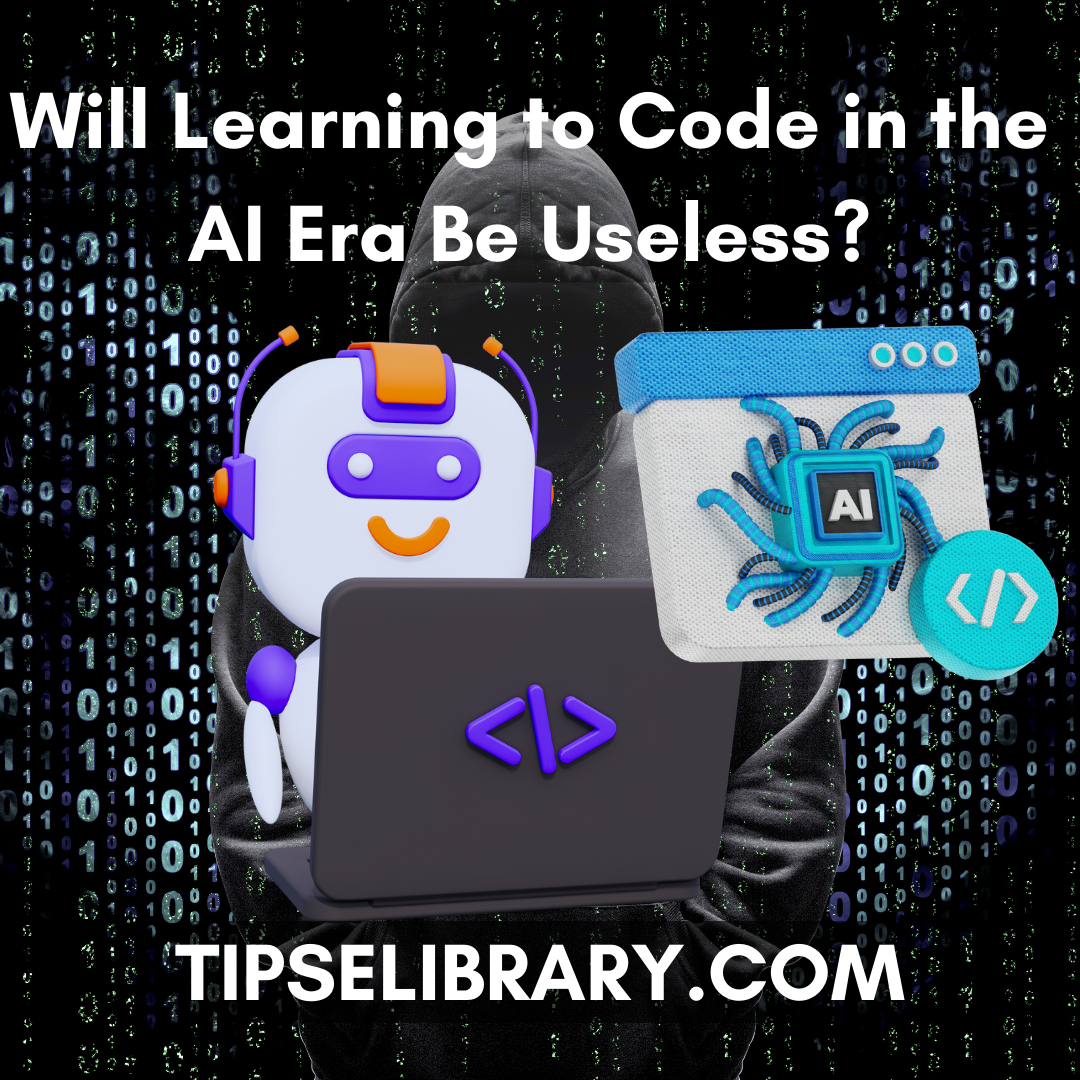Will Learning to Code in the AI Era Be Useless?
In the rapidly evolving landscape of technology, the advancements in artificial intelligence (AI) are poised to revolutionize numerous industries, including the field of software development. As AI-powered coding assistants and code generation tools become increasingly sophisticated, a pressing question arises: Will learning to code in the AI era be rendered useless?
This thought-provoking query has sparked debates and concerns within the programming community, with some fearing that AI could eventually replace human coders altogether. However, a closer examination of the potential impact of AI on coding reveals a more nuanced and complex reality. In this comprehensive article, we’ll delve into the evolution of programming languages, explore the current state of AI-powered coding tools, and assess the future role of human developers in an AI-driven world.

The Dawn of Machine Code:
The origins of programming languages can be traced back to the earliest days of computing, when programmers had to communicate with machines using binary code – a series of 0s and 1s that represented instructions for the computer to execute. This low-level language, known as machine code, was incredibly complex and error-prone, requiring a deep understanding of the intricate workings of the hardware.
Enter Assembly Language:
As computers became more sophisticated, the need for a more human-readable and efficient way of programming arose. Assembly language emerged as a stepping stone, allowing programmers to use mnemonics (short, symbolic instructions) and labels instead of raw binary code. While still closely tied to the underlying hardware, assembly language offered a degree of abstraction, making it easier to write and understand programs.
The Rise of High-Level Languages:
The 1950s and 1960s ushered in a new era of programming languages with the introduction of high-level languages like FORTRAN, LISP, COBOL, and ALGOL. These languages abstracted away the low-level details of the hardware, enabling programmers to focus on the logic and structure of their programs rather than the intricacies of the underlying machine. This shift paved the way for more efficient and productive software development, allowing programmers to tackle increasingly complex problems.
The Emergence of Object-Oriented Programming:
In the 1970s and 1980s, a new paradigm took hold in the programming world – object-oriented programming (OOP). Languages like Simula, Smalltalk, and eventually C++ introduced the concept of encapsulating data and behavior into objects, promoting code reusability, modularity, and maintainability. This approach revolutionized software design and laid the foundation for the development of many modern programming languages and frameworks.
The Rapid Advancement of Modern Languages:
As computing power and hardware capabilities increased, so did the demand for more sophisticated and specialized programming languages. The 1990s and early 2000s witnessed the rise of languages like Java, Python, Ruby, and JavaScript, each tailored to specific domains and addressing unique challenges in software development. These languages prioritized simplicity, readability, and cross-platform compatibility, making them accessible to a broader range of developers and fueling the growth of the internet and web applications.
The Current Landscape: A Diverse Ecosystem:
Today, the programming language landscape is more diverse than ever, with a multitude of languages catering to various needs and use cases. From low-level systems programming languages like C and Rust to high-level scripting languages like Python and Ruby, from functional programming languages like Haskell and Erlang to distributed computing frameworks like Apache Spark and Hadoop, the choices are vast and ever-expanding.
The Emergence of AI-Powered Coding:
As we stand on the cusp of the AI revolution, the future of programming languages is poised for a significant transformation. Advancements in artificial intelligence and machine learning are paving the way for AI-powered coding assistants and code generation tools that could fundamentally change the way we approach software development.
One of the most prominent examples of this emerging technology is Copilot, an AI-powered coding assistant developed by GitHub and OpenAI. Copilot leverages natural language processing and machine learning to understand the context and intent of your code, offering intelligent suggestions, auto-completing lines, and even generating entire functions or classes based on your input.
Another promising development is the rise of AI-powered code generation tools like OpenAI’s Codex and DeepMind’s AlphaCode. These cutting-edge systems can generate code from natural language descriptions or even translate between programming languages, potentially revolutionizing the way we create software by allowing developers to focus on defining requirements rather than writing code line by line.
The Promise of AI-Powered Coding:
The potential benefits of AI-powered coding are manifold. By automating repetitive tasks and providing intelligent assistance, these tools could significantly boost developer productivity and efficiency. They could also lower the barrier to entry for programming, enabling non-technical individuals to create software by simply describing their requirements in natural language.
Moreover, AI-powered coding could enhance code quality and maintainability by adhering to best practices, identifying potential bugs or security vulnerabilities, and suggesting optimizations. This could lead to more robust and reliable software systems, reducing the time and effort spent on debugging and maintenance.
The Future of Programming Languages and Education:
As AI-powered coding tools continue to evolve, the landscape of programming languages may undergo a transformation. While low-level languages like C and assembly will likely remain essential for systems programming and hardware interaction, the demand for traditional high-level languages may shift, with a greater emphasis on domain-specific languages, visual programming interfaces, and natural language-based coding environments.
This evolution will inevitably impact the way we approach programming education and skill development. While a solid understanding of computer science fundamentals and programming concepts will remain crucial, the focus may shift towards problem-solving, system design, and effective communication with AI-powered coding assistants.
The Role of Human Developers in an AI-Powered Future:
Despite the advancements in AI-powered coding, human developers will likely remain indispensable in the software development process. While AI can automate many tasks and provide intelligent assistance, it is unlikely to fully replace the creative problem-solving abilities, domain expertise, and strategic decision-making skills of human developers.
Human developers will play a vital role in defining requirements, architecting systems, interpreting and validating AI-generated code, and ensuring that software aligns with business objectives and ethical considerations. Additionally, as AI-powered coding tools become more sophisticated, the need for developers to understand and interpret these systems’ outputs will become increasingly important.
The Future of Coding: A Collaborative Effort:
The future of coding is likely to be a collaborative effort between humans and AI, with each playing a complementary role in the software development process. AI-powered coding assistants and code generation tools will augment human developers, automating mundane tasks and providing intelligent suggestions, while human developers will leverage their creativity, domain expertise, and critical thinking skills to guide the overall development process.
This symbiotic relationship could lead to a paradigm shift in software development, where the focus shifts from writing code line by line to defining high-level requirements, refining and validating AI-generated code, and ensuring that the software meets the desired specifications and adheres to best practices.
Is Learning to Code Still Worthwhile?
In the face of the AI revolution in coding, a natural question arises: is it still worthwhile to invest time and effort into learning programming languages and coding skills?
The answer is a resounding yes. While AI-powered coding tools will undoubtedly transform the software development landscape, they are unlikely to render traditional coding skills obsolete. Instead, these tools will augment and enhance the capabilities of human developers, making it essential to have a solid understanding of programming concepts, algorithms, and problem-solving techniques.
Moreover, learning to code fosters critical thinking, logical reasoning, and problem-solving abilities that are invaluable in any field, not just software development. These skills are highly transferable and can be applied to a wide range of industries and domains.
Furthermore, as AI-powered coding tools become more prevalent, the demand for developers who can effectively communicate with and guide these systems will likely increase. Developers with a deep understanding of programming languages, software engineering principles, and domain-specific knowledge will be well-positioned to leverage these tools effectively and ensure that the software produced aligns with business requirements and best practices.
Conclusion:
The rise of AI-powered coding tools is poised to revolutionize the software development industry, but it does not render learning to code useless. Instead, it presents an opportunity for human developers to embrace these cutting-edge technologies and leverage them to enhance their productivity, efficiency, and the quality of the software they create.
While AI will undoubtedly automate many tasks and provide intelligent assistance, human developers will remain indispensable in the software development process. Their ability to define requirements, architect systems, interpret and validate AI-generated code, and ensure alignment with business objectives and ethical considerations will be crucial.
The future of coding will be a collaborative effort between humans and AI, where the creativity and critical thinking skills of developers will be augmented by the automation and intelligent suggestions provided by AI-powered coding tools. This symbiotic relationship will enable developers to focus on higher-level tasks, such as problem-solving, system design, and effective communication, while AI handles more routine and repetitive aspects of coding.
By embracing AI as a collaborative partner, developers will be able to harness its power to streamline workflows and enhance productivity. This symbiotic relationship will not only elevate the quality of software but also drive innovation across various industries. As developers shift their focus to higher-level tasks, they will have more opportunities to engage in creative problem-solving, robust system design, and clear, effective communication—areas where human ingenuity and intuition are irreplaceable.
In conclusion, the future of coding in the AI era is not a zero-sum game where AI replaces human developers. Instead, it is a dynamic partnership where AI enhances and expands human capabilities. By adapting to this evolving landscape, developers can continue to play a pivotal role in shaping the technology that drives our world forward. Learning to code remains a valuable and worthwhile pursuit, equipping individuals with the skills needed to navigate and thrive in an AI-augmented future.
Learning to code remains a valuable and worthwhile pursuit, equipping individuals with the skills needed to navigate and thrive in an AI-augmented future.
Stay ahead in the ever-evolving tech landscape by subscribing to our newsletter at Tipselibrary.com! Get the latest insights, tips, and resources delivered straight to your inbox. Whether you’re a seasoned developer or just starting out, our newsletter will keep you informed and inspired. Don’t miss out—subscribe today and join a community of forward-thinking professionals ready to harness the power of AI and beyond!
More from Tipelibrary
Navigating the Digital Maze: A Journey Towards Mindful Technology Use
- January 29, 2024
- 3 Minutes
How to Create a WooCommerce Website: Complete Guide for 2024
- August 14, 2024
- 9 Minutes
Starting a Successful Blog: Transform Your Passion into Profit
- October 25, 2023
- 3 Minutes








